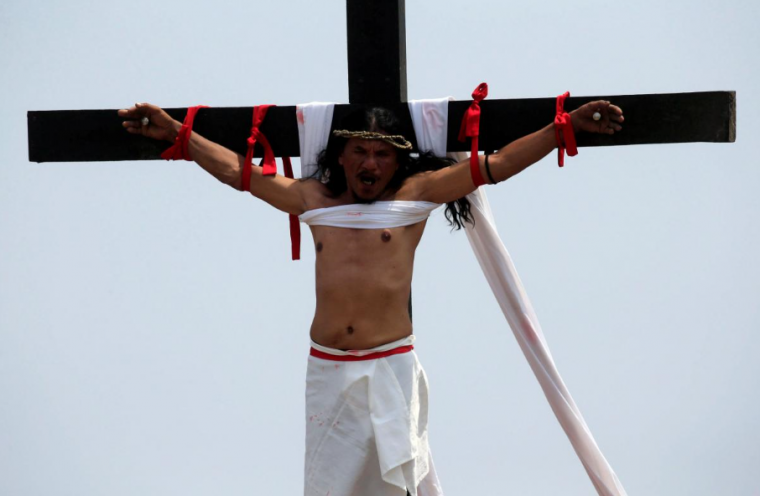Is the church obsessed with sin and judgment?
We all carry our early experiences of Christmas and Easter into our adult life. It's inevitable and it is the lens through which we interpret the present.
I know I have an over-sentimentalised blueprint for Christmas. My mum was Swiss but living in England, and recreating some of the Swiss traditions was a way of keeping her Swiss identity alive. So we had wonderful homemade Swiss cookies, a tree with real candles we were only allowed to see on Christmas Eve, and handmade presents that my mother would be sewing in secret all through the autumn. Christmas feels like a warm, safe place.

Easter was very different. It was totally dominated by Good Friday. As a church we had a massive bun fight at around 5 pm and most of the day was spent making sandwiches. I would help out the ladies – yes, all ladies of course – who seemed impossibly old. They worked very hard at being nice but I could tell they didn't really like children very much.
My feelings however, were totally dominated by a sense of dread. I knew the Good Friday service was coming and I was terrified.
Year after year after year, the story of the crucifixion was told in the most graphic way imaginable. The whole process was unpacked. The torn flesh, the crushing sense of suffocation, the competing pain around the body. No detail was left untold. That was just the beginning. Then there was the sin. The weight of all the sin of the world was also suffered. A weight to vast that only God could bear it, a weight that went beyond that supreme agony when God himself abandoned his son. Then of course there was still hell to be tackled.
All that would have been bad enough, but the real twist came when the ball of responsibility was thrown to every single person in the church. If you were the only person left on earth Jesus would still have had to suffer all this to deal with your sin. It was your sin that took him to the cross.
I remember very clearly hearing Matthew Parris at a debate saying with considerable feeling that he was not willing to accept that he was personally responsible for crucifying Jesus –and thinking that he had a point.
So I grew up, like so many of us I guess, feeling, if not actually thinking, that sin was the main point about Christianity. It was compounded by my experience in two very well known London churches where you were expected to invite your friends to come and hear the gospel. What happened was that perfectly happy and well-adjusted people would be told that they were wicked and sinful, but not to worry because Jesus had dealt with that on the cross and if you gave your life to him you'd be alright after all.
It was all about the sin. And all too often it still is. We seem to need to assess someone's sin status before we can know how to relate to them. Whole parts of the church break away because they are more concerned about the perceived sin of the other than about their humanity. Classically at the moment the focus is on loving gay relationships. It seems impossible to talk about the love and the flourishing and the relationship because of the love of, the fixating on, sin.
So I opened my Bible to preach on the Sunday after Easter. Surely if it was all about the sin, then the risen Jesus is going to explain. 'It's alright, folks! All that agony that I went through means that your sins are dealt with. You are forgiven. The problem is solved.'
Let's skip over the fact that Jesus was capable of saying 'your sin is forgiven' before his death, which might imply that one is not necessarily a consequence of the other. The main point is that he simply didn't go down that route.
Just imagine that, as a consequence of some extraordinary sacrifice something very, very wonderful could happen. What would you wish for? If there were a cosmic Solomon moment what would change the whole world?
'Jesus came and stood among them and said, "Peace be with you."'
For me this year more than ever before, the cross speaks of breaking the cycle of violence, and the resurrection offers us peace and hope. If there is any point at all in being church we need to embody this by the way we treat one another. It's costly. We've got into the habit of seeing each other's sin and the recent IICSA hearings in a way underline this: where are the shortcomings? Who failed? Who did wrong?
The purpose surely must be to bring about peace, not primarily to judge. There are many survivors whose dearest wish is for peace. It may be incredibly costly for some senior staff to look at how they have reacted, apologise deeply and offer to rebuild relationships and make reparation. Peacemaking is hard. Until this happens the gospel will end up being bad news, and all about sin.
The true gospel of Easter is genuinely, tangibly good news and leads to peace.
Rev Canon Rosie Harper is chaplain to the Bishop of Buckingham and a member of the Church of England's General Synod.
This article appears on ViaMedia News and is used with permission.











